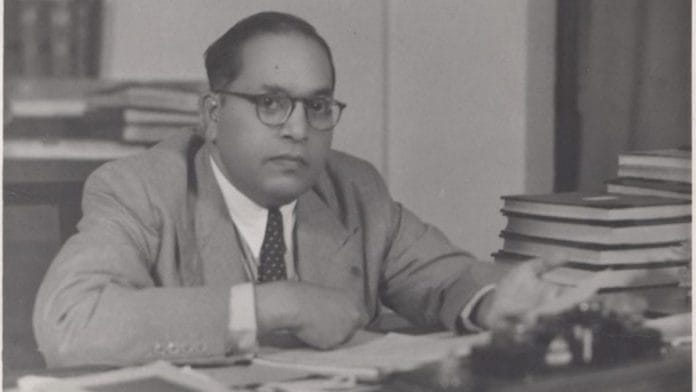Thank you dear subscribers, we are overwhelmed with your response.
Your Turn is a unique section from ThePrint featuring points of view from its subscribers. If you are a subscriber, have a point of view, please send it to us. If not, do subscribe here: https://theprint.in/
Dr. B.R. Ambedkar, the chief architect of the Indian Constitution and a social reformer, had deeply studied the issues of caste, religion, and politics in India. While he is widely known for his role in advocating Dalit rights and framing the Constitution, his views on Muslims, as expressed in his writings, particularly Pakistan or The Partition of India (1940), provide a critical perspective on Hindu-Muslim relations, the idea of Pakistan, and the socio-political behavior of Muslims in India.
This article examines Ambedkar’s views on Muslims, drawing upon his books, especially Pakistan or The Partition of India, Thoughts on Linguistic States, and The Problem of the Rupee.
Ambedkar on Hindu-Muslim Relations
Ambedkar did not subscribe to the romanticized version of Hindu-Muslim unity that was often promoted by nationalist leaders. In Pakistan or The Partition of India, he argued that Hindu-Muslim relations were deeply antagonistic, and the conflict was not just political but also social and religious.
He believed that the differences between Hindus and Muslims were irreconcilable due to their fundamental religious beliefs and historical experiences. He wrote:
“The brotherhood of Islam is not the universal brotherhood of man. It is the brotherhood of Muslims for Muslims only.”
Ambedkar pointed out that Islam did not promote universalism but rather divided the world into Dar al-Islam (land of Islam) and Dar al-Harb(land of war), which made peaceful coexistence difficult. He was critical of the political behavior of Muslims, whom he accused of prioritizing religious identity over national unity.
Ambedkar’s Views on Muslim Society
While Ambedkar was a vocal critic of the caste system in Hinduism, he also criticized social issues within Muslim society. He noted that caste and social stratification were present among Muslims as well. In Pakistan or The Partition of India, he wrote:
“Islam speaks of brotherhood. Everybody infers that Islam must be free from slavery and caste. While slavery has gone, caste among Muslims has remained.”
Ambedkar observed that Indian Muslims had a system of social hierarchy similar to the Hindu caste system, with distinctions such as Ashraf (upper-class Muslims of foreign origin) and Ajlaf (local converts). He also pointed out that Muslims in India practiced untouchability against groups like Arzal Muslims (considered lower-class).
He further criticized the treatment of women in Islamic society, arguing that the practice of purdah (veiling and seclusion) led to a lack of education and economic independence for Muslim women, keeping them in a subordinate position.
Ambedkar on the Demand for Pakistan
Ambedkar supported the idea of Pakistan as a separate Muslim state, not because he wanted India to be divided, but because he believed that forcing Hindus and Muslims to coexist in one country would lead to continuous conflict. In Pakistan or The Partition of India, he wrote:
“The real explanation of this failure of Hindu-Muslim unity lies in the fact that the Muslims will not recognize that Hindus are their kith and kin.”
Ambedkar argued that the Muslim League’s demand for Pakistan was based on the belief that Hindus and Muslims were two separate nations. He believed that conceding Pakistan might prevent a civil war in India. However, he also warned that an independent Pakistan would not necessarily be a democratic state and could fall into authoritarianism.
Ambedkar on Muslim Political Behavior
Ambedkar observed that Muslims had a distinct political strategy compared to Hindus. He believed that Muslim politics were centered around religious identity, which made them more aggressive in asserting their demands. He wrote:
“Wherever there is a conflict between Muslim law and common law, it is the Muslim law that must prevail.”
He also pointed out that Muslims tended to vote as a bloc, often driven by religious considerations rather than national interest. This, he argued, made democratic governance difficult in a multi-religious country like India.
Ambedkar on Hindu Appeasement of Muslims
Ambedkar was critical of Hindu leaders who sought to appease Muslims, believing that such appeasement would not lead to genuine unity. He accused Gandhi and the Congress of making excessive concessions to Muslims while ignoring issues faced by Dalits and other marginalized groups.
He believed that the Congress’ attempt to present Muslims as perpetual victims was flawed, as it ignored the historical instances where Muslims had been aggressors.
Conclusion
Dr. Ambedkar’s views on Muslims were shaped by his pragmatic and critical approach to Indian society. While he sympathized with the struggles of marginalized communities, he did not shy away from criticizing the social and political issues within Muslim society. He believed that Hindu-Muslim unity was difficult due to deep-seated religious and political differences.
His analysis of Muslim society, politics, and the demand for Pakistan remains relevant today in discussions on communalism, secularism, and the challenges of a diverse democracy like India. Ambedkar’s writings serve as an important resource for understanding the complexities of Hindu-Muslim relations in modern India.
These pieces are being published as they have been received – they have not been edited/fact-checked by ThePrint.


